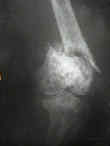- See: Bone Topics
- Discussion:
- woven bone healing:
- ref: Distal radial fractures heal by direct woven bone formation
- stages of enchondral bone healing:
- hematoma / inflammation:
- shortest stage of fracture healing
- disruption of vascular flow through the marrow and periosteum
- infiltration of hematopoietic cells for hematoma formation, phagocytosis,
and reparative cytokine production
- ref: Human Early Fracture Hematoma Is Characterized by Inflammation and Hypoxia
- endochondral ossification (chondrogenesis)
- low oxygen tension where woven bone develops to stabilize the fracture
- remodeling / intramembranous ossification:
- strain results in the formation of collagen and intramembranous ossification;
- neovascularization, differentiation of mesenchymal stem cells into osteoblasts
- replacement of the cartilaginous callus by bone callus with remodeling;
- references:
- The four biomechanical stages of fracture repair.
- Evidence for a humoral mechanism for enhanced osteogenesis after head injury.
- The biology of fracture repair.
- bone healing w/ plates:
- pure compression and hydrostatic pressure causes mesenchymal cells to differentiate to chondrogenesis
and endochondral ossification;
- references:
- Evolution of the internal fixation of long bone fractures. choosing a new balance between stability and biology.
- Comparison of the effects of compression plates and external fixators on early bone-healing.
- Bone-healing patterns affected by loading, fracture fragment stability, fracture type, and fracture site compression.
- Motion Predicts Clinical Callus Formation: Construct- Finite Element Analysis of Supracondylar Femoral Fractures.
- Dynamic Stabilization with Active Locking Plates Delivers Faster, Stronger, and More Symmetric Fracture-Healing
- bone vascular supply:
- fracture healing depends on adequate blood supply.
- The vascular response to fracture micromovement.
- The effects of extraperiosteal and subperiosteal dissection. II. On fracture healing.
- The effects of extraperiosteal and subperiosteal dissection. I. On blood flow in muscle.
- fracture healing depends on periosteum:
- Periosteal and perichondral grafting in reconstructive surgery.
- The presence of periosteum is essential for the healing of large diaphyseal segmental bone defects reconstructed with trabecular metal: a study in the femur of goats.
- The induction of neochondrogenesis in free intra-articular periosteal autografts under influence of CPM.
- Radiographic Determinants of Healing: (non union)
- restoration of cortical continuity (look for healing on 4 cortices - AP and lateral views);
- loss of distinct fracture line;
- presence of callus (w/ IM nail or external fixator);
- references:
- Accuracy of radiologic assessment of tibial shaft fracture union in humans
- Correlations of radiographic analysis of healing fractures with strength: a statistical analysis of experimental osteotomies.
- age:
- references:
- Aging of bone tissue: mechanical properties.
- Age-related changes in properties of cortical bone. The importance of porosity, mineralization, and microstructure.
- Structural and cellular changes during bone growth in healthy children.
- Negative Influences on Bone Healing:
- Positive Influences on Bone Healing:
- Labs to Promote Bone Healing:
- vitamin D, B12, DHEA, testosterone, E1, and E2, liver enzymes, and parathyroid hormone level.
- ref: A study of male patients with forearm fracture in Northern Ireland.
- Induction of Bone Healing:
- autograft / allografts:
- bone morphogenic proteins:
- ultrasound:
- Low intensity pulsed ultrasound accelerates delayed healing process by reducing the time required for the completion of endochondral ossification in the aged mouse femur fracture model.
- electrical properties of bone:
- bone loaded in compression will cause an electronegative field;
- bone loaded in tension will cause an electropositive field;
- references:
- Treatment of recalcitrant non-union with a capacitively coupled electrical field. A preliminary report.
- Intraoperative measurement of bone electrical potential: a piece in the puzzle of understanding fracture healing.
The biology of fracture healing in long bones
Repair of segmental bone defects in the rat: an experimental model of human fracture healing.
Effect of intense physical activity on the bone-mineral content in the lower limbs of young adults.
Humeral hypertrophy in response to exercise.
The science of fracture healing.
Indirect reduction brought surgeons back to basics
Immobilizing the fracture: nonsurgical fracture treatment
Non Sine Gloria
Use of clinical assessment tools in the evaluation of fracture healing

